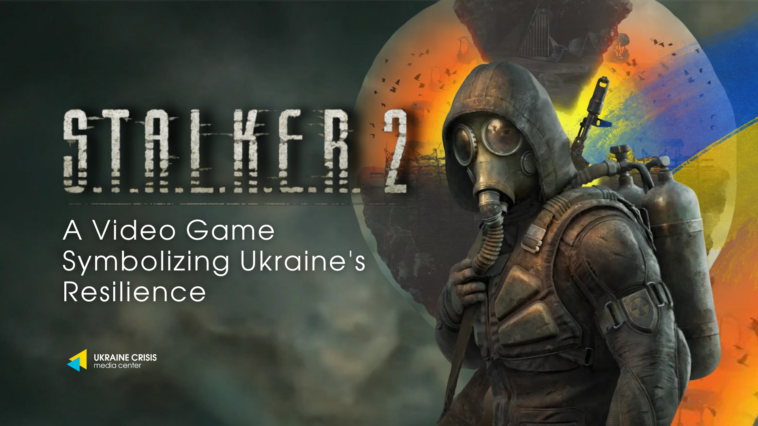By Viktoria Odusanvo
On November 20, S.T.A.L.K.E.R. 2: Heart of Chornobyl was released by the Ukrainian studio GSC Game World.
The announcement of work on the game dates back to 2010, but since then, the final release date of the video game has been postponed numerous times. In June 2022, the developers stated that they would continue working on the game despite Russia’s full-scale invasion. Around the same time, GSC Game World announced that the game would not be sold in the territory of the aggressor country. They also changed the English transliteration of the title from the previously “Russified” Heart of Chernobyl to Heart of Chornobyl, in accordance with the Ukrainian name “Chornobyl.” This marked the final “breakdown” of relations between one of the largest Ukrainian game studios and the Russian gaming community.
By the time of the game’s release, the team that brought the project to life had come a long way, working under constant shelling and blackouts. Some of the developers even joined the ranks of the Ukrainian Armed Forces. In the game’s credits, GSC Game World left a message to the world:
“Through death and pain, war, fear, and cruelty, Ukraine will go through and survive. It has always done so and will do so again… Dedicated to all those who have defended and are defending Ukraine. To all who made today possible. Eternal memory to all those who were taken by this war.”
S.T.A.L.K.E.R. 2 has already become a symbol of resilience within Ukrainian society. As the developers stated in a letter to fans, “This is a project of endless love and passion of the entire team. Our own story and message of love for Ukraine.”
Of course, the video game was not spared from sabotage attempts by Russian hackers. In March 2023, Russian cybercriminals hacked into GSC Game World’s servers, demanding that the company add Russian voice acting to the game and threatening to publish the stolen materials if their “demands” were not met.
Despite all obstacles, S.T.A.L.K.E.R. 2: Heart of Chornobyl became an instant hit among gamers. Within the first two days of its release, one million copies of the video game were sold (excluding players with Game Pass).
This success is vital not only for the gaming community but also for Ukraine as a whole, drawing global attention to Ukrainian culture. For example, the video game features over 400 Ukrainian songs.
The success of S.T.A.L.K.E.R. 2 has sparked concern among Kremlin ideologues, who have long propagated the falsehood that Ukraine cannot succeed in modern technological fields on its own. When their attempts to disrupt the release of the video game failed, Russian efforts shifted to discrediting it.
Ahead of the release of S.T.A.L.K.E.R. 2: Heart of Chornobyl, Russian authorities announced criminal liability for purchasing the game, labelling it “extremist” and “Russophobic.” Thousands of Russian players, overestimating their ability to “understand Ukrainian by ear,” failed to grasp the Ukrainian language in the game. Frustrated, they began mocking Ukrainian language and culture. One Russian streamer went as far as carving the “Z” symbol onto the corpses of digital characters during his streams on the Twitch platform, for which he was promptly banned.
As the game was withdrawn from sale in Russia, many resorted to piracy. Russian State Duma deputy Anton Gorelkin suggested altering the game to remove “extremist” elements, adding Russian voice acting, and selling it on a Russian platform, with a portion of the profits directed to support illegal armed groups. Concerns about copyright, predictably, were ignored by both Russian players and officials.
Another tactic involved creating mods to replace the Ukrainian localisation and songs with Russian ones. Some Russian modders even expressed outrage on the game’s website over GSC Game World’s refusal to officially approve mods that “Russify” the game, accusing the company of “discrimination on the basis of language” and a lack of “European principles and tolerance.”
Russians do not shy away from the old and proven method of bribery. Thus, offers to give a game a bad review and receive money for it began to appear on the Telegram messenger.
This campaign ultimately failed. As of November 27, one week after its release, the game boasts a 78% positive rating on Steam and an 8/10 score on IGN.
The Russian reaction to S.T.A.L.K.E.R. 2 exemplifies their attempts to devalue Ukrainian culture, reducing it to a peripheral “appendix” of the Russian tradition. Yet the present proves the futility of these efforts. In the third year of the full-scale war, Ukrainian developers are creating products that hold their own in the global video game market. S.T.A.L.K.E.R. 2 is a compelling testament to the innovative power of Ukrainian culture and its unstoppable ability to thrive.

